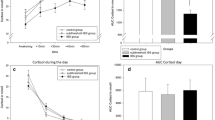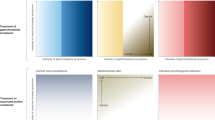Abstract
Previous research has established that patients with irritable bowel syndrome (IBS) frequently have comorbid psychiatric disorders. This study sought to establish if the timing of the onset of psychiatric disorders indicated that IBS was more likely to be caused by or more likely to cause psychological difficulties. Participants were 188 treatment-seeking IBS patients who were assessed for psychiatric diagnoses using a semistructured clinical interview. Timing of the onset of any lifetime psychiatric disorders was noted in an attempt to determine if psychiatric disorders were more likely to precede or follow the onset of IBS symptoms. Those participants that met criteria for an Axis I disorder sometime during their life were significantly more likely to develop an Axis I disorder before the onset of IBS symptoms. Anxiety disorders were the most likely disorder to develop before IBS. These results support the theory that psychiatric symptoms, especially anxiety, play a role in the development of IBS.
Similar content being viewed by others
References
Blanchard, E. B. (2001). Irritable Bowel Syndrome: Psychosocial Assessment and Treatment, American Psychological Association, Washington, DC.
Blanchard, E. B., Scharff, L., Schwarz, S., Suls, J. M., and Barlow, D. H. (1990). The role of anxiety and depression in the irritable bowel syndrome. Behav. Res. Ther. 28(5): 401–405.
Collins, S. M., Vallance, B., Barbara, G., and Borgaonkar, M. (1999). Putative inflammatory and immunological mechanisms in functional bowel disorders. Baillieres Best Pract. Res. Clin. Gastroenterol. 13(3): 429–436.
Dewsnap, P., Gomborone, J., Libby, G., and Farthing, M. (1996). The prevalence of symptoms of irritable bowel syndrome among acute psychiatric inpatients with an affective diagnosis. Psychosomatics 37: 385–389.
Drossman, D. A., Li, Z., Andruzzi, E., Temple, R., Talley, N. J., Thompson, W. G., Whitehead, W. E., Janssens, J., Funch-Jensen, P., Corazziari, E., Richter, J. E., and Koch, G. G. (1993). U.S. householder survey of functional gastrointestinal disorders: Prevalence, sociodemography and health impact. Dig. Dis. Sci. 38: 1569–1580.
First, M. B., Gibbon, M., Spitzer, R. L., and Williams, J. B. W. (1996). Structured Clinical Interview for DSM-IV, Biometrics Research Department, New York State Psychiatric Institute, New York.
Folks, D. G., and Kinney, F. C. (1992). The role of psychological factors in gastrointestinal conditions. Psychosomatics 33(3): 257–267.
Gaynes, B. N., and Drossman, D. A. (1999). The role of psychological factors in irritable bowel syndrome. Baillieres Clin. Gastroenterol. 13(3): 437–452.
Jarret, M., Heitkemper, M., Cain, K. C., Tuftin, M., Walker, E. A., Bond, E. F., and Levy, R. L. (1998). The relationship between psychological distress and gastrointestinal symptoms in women with irritable bowel syndrome. Nurs. Res. 47: 154–161.
Jones, R., and Lydeard, S. (1992). Irritable bowel syndrome in the general population. Br. Med. J. 304: 87–90.
Kaplan, D. S., Masand, P. S., and Gupta, S. (1996). The relationship of irritable bowel syndrome (IBS) and panic disorder. Ann. Clin. Psychiatry. 8(2): 81–88.
Keller, M. B., Lavori, P. W., Friedman, B., Nielsen, E., Endicott, J., McDonald-Scott, P., and Andreasen, N. C. (1987). The longitudinal interval follow-up evaluation: A comprehensive method for assessing outcome in prospective longitudinal studies. Arch. Gen. Psychiatry 44: 540–548.
Lydiard, R. B., Fossey, M. D., Marsh, W., and Ballenger, J. C. (1993). Prevalence of psychiatric disorders in patients with irritable bowel syndrome. Psychosomatics 34(3): 229–233.
Lydiard, R. B., Laraia, M. T., Howell, E. F., and Ballenger, J. C. (1986). Can panic disorder present as irritable bowel syndrome? J. Clin. Psychiatry 47: 470–473.
Masand, P. S., Kaplan, D. S., Gupta, S., Bhandary, A. N., Nasra, G. S., Kline, M. D., and Margo, K. L. (1995). Major depression and irritable bowel syndrome: Is there a relationship? J. Clin. Psychiatry 56: 363–367.
Mitchell, C. M., and Drossman, D. A. (1987). Survey of the AGA membership relating to patients with functional gastrointestinal disorders. Gastroenterology 92: 1281–1284.
Noyes, R., Jr., Cook, B., Garvey, M., and Summers, R. (1990). Reduction of gastrointestinal symptoms following treatment for panic disorder. Psychosomatics 31: 75–79.
Sandler, R. S. (1990). Epidemiology of irritable bowel syndrome in the United States. Gastroenterology 99(2): 409–415.
Simon, G. E., and VonKorff, M. (1991). Somatization and psychiatric disorder in the NIMH Epidemiologic Catchment Area study. Am. J. Psychiatry 148(11): 1494–1500.
Talley, N. J., Phillips, S. F., Bruce, B., Twomey, C. K., Zinsmeister, A. R., and Melton, L. J., III (1990). Relation among personality and symptoms in non-ulcer dyspepsia and the irritable bowel syndrome. Gastroenterology 99: 327–333.
Talley, N. J., Zinsmeister, A. R., VanDyke, C., and Melton, L. J. (1991). Epidemiology of colonic symptoms and the irritable bowel syndrome. Gastroenterology 101: 927–934.
Tollefson, G. D., Luxenberg, M., Valentine, R., Dunsmore, G., and Tollefson, S. L. (1991). An open label trial of alprazolam in comorbid irritable bowel syndrome and generalized anxiety disorder. J. Clin. Psychiatry 52(12): 502–508.
Walker, E. A., Gelfand, A. N., Gelfand, M. D., and Katon, W. J. (1995). Psychiatric diagnoses, sexual and physical victimization, and disability in patients with irritable bowel syndrome or inflammatory bowel disease. Psychol. Med. 25: 1259–1267.
Walker, E. A., Roy-Byrne, P. P., and Katon, W. J. (1990a). Irritable bowel syndrome and psychiatric illness. Am. J. Psychiatry 147(5): 565–572.
Walker, E. A., Roy-Byrne, P. P., Katon, W. J., Li, L., Amos, D., and Jiranek, G. (1990b). Psychiatric illness and irritable bowel syndrome: A comparison with inflammatory bowel disease. Am. J. Psychiatry 147: 1656–1661.
World Health Organization (1978). Mental Disorders: Glossary and Guide to Their Classification in Accordance With the Ninth Revision of the International Classification of Diseases, World Health Organization, Geneva, Switzerland.
Author information
Authors and Affiliations
Corresponding author
Rights and permissions
About this article
Cite this article
Sykes, M.A., Blanchard, E.B., Lackner, J. et al. Psychopathology in Irritable Bowel Syndrome: Support for a Psychophysiological Model. J Behav Med 26, 361–372 (2003). https://doi.org/10.1023/A:1024209111909
Issue Date:
DOI: https://doi.org/10.1023/A:1024209111909




